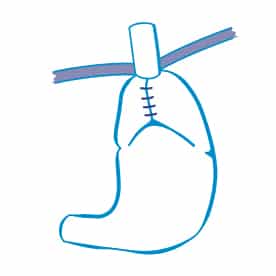
Anti-reflux surgery is a surgery that is performed to treat gastroesophageal reflux disease (GORD/GERD), also known as heartburn. GORD is a condition that occurs when stomach acid refluxes up into the oesophagus, the tube that connects the mouth to the stomach. This can cause a burning sensation in the chest, along with other symptoms such as regurgitation, a sour taste in the mouth, and difficulty swallowing.
Anti-reflux surgery is often considered for patients with GORD who do not respond well to medication or who cannot take medications for other reasons. It may also be considered for patients with severe GORD that has caused damage to the oesophagus or led to a condition called Barrett’s oesophagus.
What are the different types of anti-reflux surgery?
There are two main types of anti-reflux surgery:
Which type of anti-reflux surgery is right for me?
The type of anti-reflux surgery that is right for you will depend on your individual circumstances. Your doctor will discuss the different options with you and help you to decide which surgery is best for you.
What are the risks of anti-reflux surgery?
Like any surgery, anti-reflux surgery carries some risks. However, the overall risk of complications is relatively low. Some of the potential risks of anti-reflux surgery include:
What is the recovery process like after anti-reflux surgery?
Most people stay in the hospital for 2-3 days after anti-reflux surgery. After surgery, you will need to follow a strict diet to allow your stomach and oesophagus to heal. You will start with a liquid diet and gradually move up to pureed and then solid diet over a few weeks.
What is the long-term outlook after anti-reflux surgery?
Anti-reflux surgery is a very effective treatment for GORD. Most people who have anti-reflux surgery experience significant relief from their symptoms, and resolution of their reflux and therefore be able to stop anti-acid medication.
Additional information for non-medical readers
If you are considering anti-reflux surgery, talk to your doctor to learn more about the risks and benefits of this procedure. They can help you to decide if anti-reflux surgery is the right option for you.
Specifically for weight loss surgery patients
If you have had weight loss surgery (e.g. a gastric sleeve) and you are experiencing GORD, talk to your doctor about whether anti-reflux surgery may be an option for you. Laparoscopic Hiatus Hernia Repair can be very effective in treating GORD after Gastric Sleeve surgery.
If you have not had weight loss surgery but are considering it AND you also have pre-existing severe GORD, bariatric surgery can be very effective at dealing with these two issues. The gold standard operation in this case is to have a Roux-en-Y gastric bypass.
Overall, anti-reflux surgery is a safe and effective treatment for GORD in weight loss surgery patients. However, it is important to discuss the risks and benefits of surgery with your doctor
For severe reflux, anti-reflux surgery can be considered in some circumstances. It is generally very effective and performed laparoscopically (keyhole method).
The nature of the surgery usually involves Hiatus Hernia Repair plus or minus Nissen Fundoplication (a particular technique of forming a stomach wrap at the top of the stomach to reduce acid reflux).
The indication for surgery may be severe gastroesophageal reflux disease or ‘GORD’ for patients who do not respond completely to medications or cannot take medications for various reasons. Or it can be for the secondary damages of long term reflux such as Barrett’s oesophagus.
A hiatus hernia refers to part of the stomach sliding up into the chest and is a common cause of reflux/heartburn. It is sometimes seen after gastric sleeve surgery.
You might experience the following if you have reflux:
In this procedure, the surgeon will first treat the hiatal hernia (if present). Then, they will wrap the top of the stomach around the lower oesophagus. This makes it difficult for acid to come back up into the oesophagus, which is what causes reflux.
Hiatus hernia repairs are performed by repairing the break in the diaphragm. Your surgeon will pull the stomach back down into your abdomen and secure it with a suture (stitches) to stop it from poking through again. They will then tighten the hiatus in the diaphragm to help control reflux.